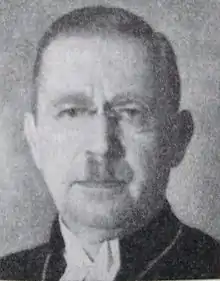Tor Andræ
Tor Julius Efraim Andræ (Swedish: [ˈtuːr anˈdreː]; 9 July 1885 – 24 February 1947) was a Swedish clergyman, professor and scholar of comparative religion who served as Bishop of the Diocese of Linköping. [1]
The Right Reverend Tor Andrae | |
|---|---|
| Bishop of Linköping | |
 | |
| Church | Church of Sweden |
| Diocese | Diocese of Linköping |
| In office | 1936-1947 |
| Predecessor | Erik Aurelius |
| Successor | Torsten Ysander |
| Personal details | |
| Born | July 9, 1885 Vena, Sweden |
| Died | February 24, 1947 (aged 61) Linköping, Sweden |
| Nationality | Swedish |
| Spouse | Ellen Gustafsson (1913-1947) |
| Children | Håkan Andrae Staffan Andrae Anders Johan Andrae Carl Göran Andræ |
| Occupation | Bishop |
Biography
Andræ was born at Vena parish in Hultsfred Municipality in Kalmar County, Sweden. He came from a clerical family. He was the son of pastor Anders Johan Andræ and Ida Nilsson. He studied theology at Uppsala University, where he completed his Ph.D. in 1917. As a historian of religion, his particular interest lay in the early history of Islam, particularly its Jewish and Christian origins, and in the psychology of religion, but he also combined these interests in the study of early Islamic mysticism.[2]
He became church pastor at Gamla Uppsala in 1924. Between 1927 and 1929, he served as professor of religious history at Stockholm University and then became professor of theological encyclopedia at Uppsala University. Andræ was a student of Nathan Söderblom, whom he succeeded as member of the Swedish Academy in 1932. He was appointed Bishop of the Diocese of Linköping in 1936 and was the same year briefly Minister for Ecclesiastical Affairs (Minister of Education) in the short-lived cabinet of Prime Minister Axel Pehrsson-Bramstorp. He died during 1947 in Linköping and was buried at Uppsala gamla kyrkogård. [3]
In 1985, Annemarie Schimmel remarked that until then only one study had "tried specifically to depict Muhammad's role in Islamic piety. Even today Tor Andrae's Die person Muhammeds in lehre und glaube seiner Gemeinde (1918) remains the standard work in this area, unsuperseded by any other major study, though complemented by random remarks in numerous modern work on Sufism. It is, however, unfortunately too little known even among Islamicists." [4]
References
- "Andræ, Tor Julius Efraim". Biografisk matrikel över Svenska kyrkans prästerskap. 1934. Retrieved April 1, 2020.
- "Andræ, Tor Julius Efraim, biskop, religionsvetenskapsman (1885–1947)". Svenska Akademien. Retrieved April 1, 2020.
- William A Graham. "Tor Julius Efraim Andræ". Religion Past and Present. doi:10.1163/1877-5888_rpp_SIM_00687. Retrieved April 1, 2020.
- Annemarie Schimmel (1985). And Muhammad is his messenger: the veneration of the Prophet in Islamic piety. University of North Carolina Press. p. 7. ISBN 978-0-8078-1639-4.
| Cultural offices | ||
|---|---|---|
| Preceded by Nathan Söderblom |
Swedish Academy, Seat No 16 1932–1947 |
Succeeded by Elias Wessén |